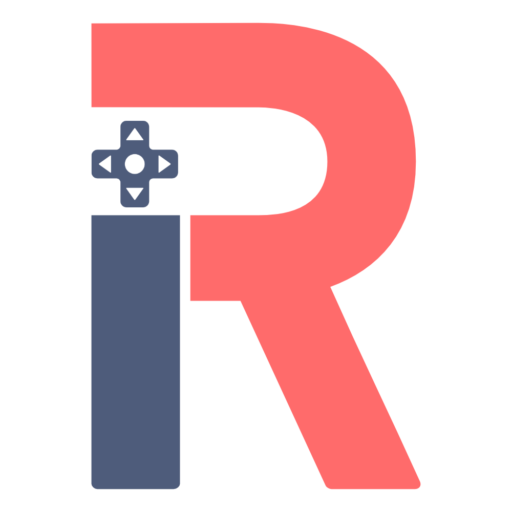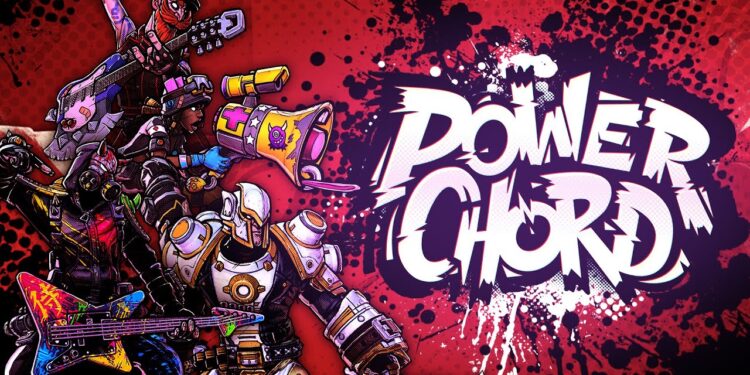Two years ago, indie game developer Big Blue Bubble released Foregone – a 2D action platformer that stole my heart with its high-octane, fast-paced gameplay, stunning pixel-art, and memorable soundtrack. I knew then that the Canadian-based indie dev would be one to watch, and I anxiously anticipated the team’s next release. Flash forward to the present, and Big Blue Bubble has swapped out the sprites for 3D models, chiptunes for rock n’ roll, and side-scrolling platforming for roguelike deck-building to create Power Chord.
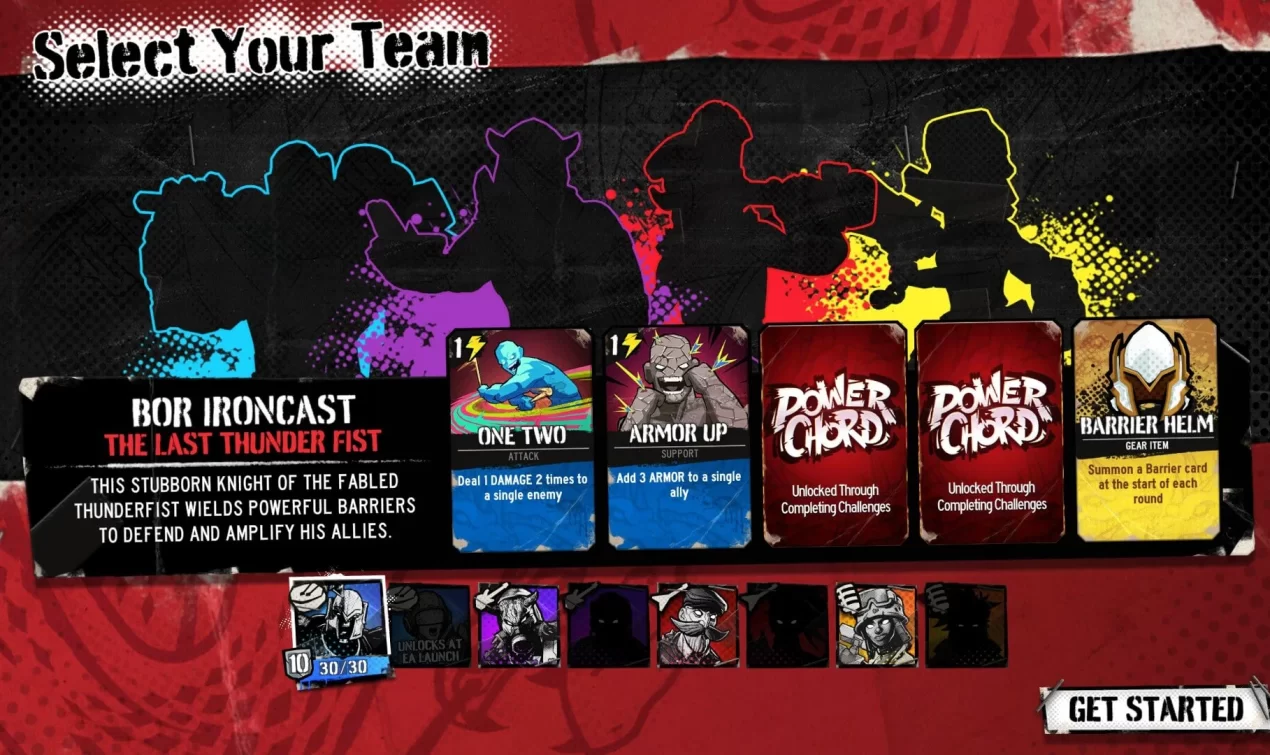
Power Chord sets up its rockin’, heavy metal-infused world with an over-the-top premise that channels some serious Brutal Legend vibes. Ages ago, a portal from Hell vomited out a bunch of demons and now its up to a motley crew of Earth’s mightiest musicians to battle the army hellspawn…on a stage…with a bunch of band instruments. Silly? Yes. Awesome? Double yes.
At the onset, you are tasked with assembling your band. The blue-clad Drummer deploys shields to absorb damage and barriers to negate incoming attacks. He can also tank damage, and can deal decent damage. The purple-colored Bassist is your AoE guy and focuses on debuffs to lower enemy damage output and defenses and can employ nasty effects like Poison and Corrosion. Next up is the red-tinted Guitarist, a heavy-hitter who stockpiles Rage as he takes damage and can then unleash that fury for some serious, face-melting pain. And finally there is the yellow-tinged Vocalist, who can amplify/buff the band’s abilities or deal damage to enemies to gain a smidgen of health in return. Much like an actual band, everyone has a part to play, and your success hinges on every one playing to their strengths. It makes for a strategic experience that constantly continues to evolve as you kick demon butt and you unlock new cards to add to your deck. What’s even better is that you can recruit new band members as you progress. For example, your starting Drummer is all about defense and protecting the party. As you make your way across the twisted hellscape, you will eventually unlock another Drummer that brings their own set of perks and abilities to the stage. Whereas the initial one would hardly deal any damage, the new one could stockpile a stat known as Stone and – much like the Guitarist – could let loose for one devastating blow. It adds a fun layer of strategy to an already strategic game. And with the promise of more band members to come, Power Chord sets itself up nicely for high replayability. It also helps that enemy encounters are hella-fun, even when you are getting your teeth kicked in by the diverse roster of demon scum.
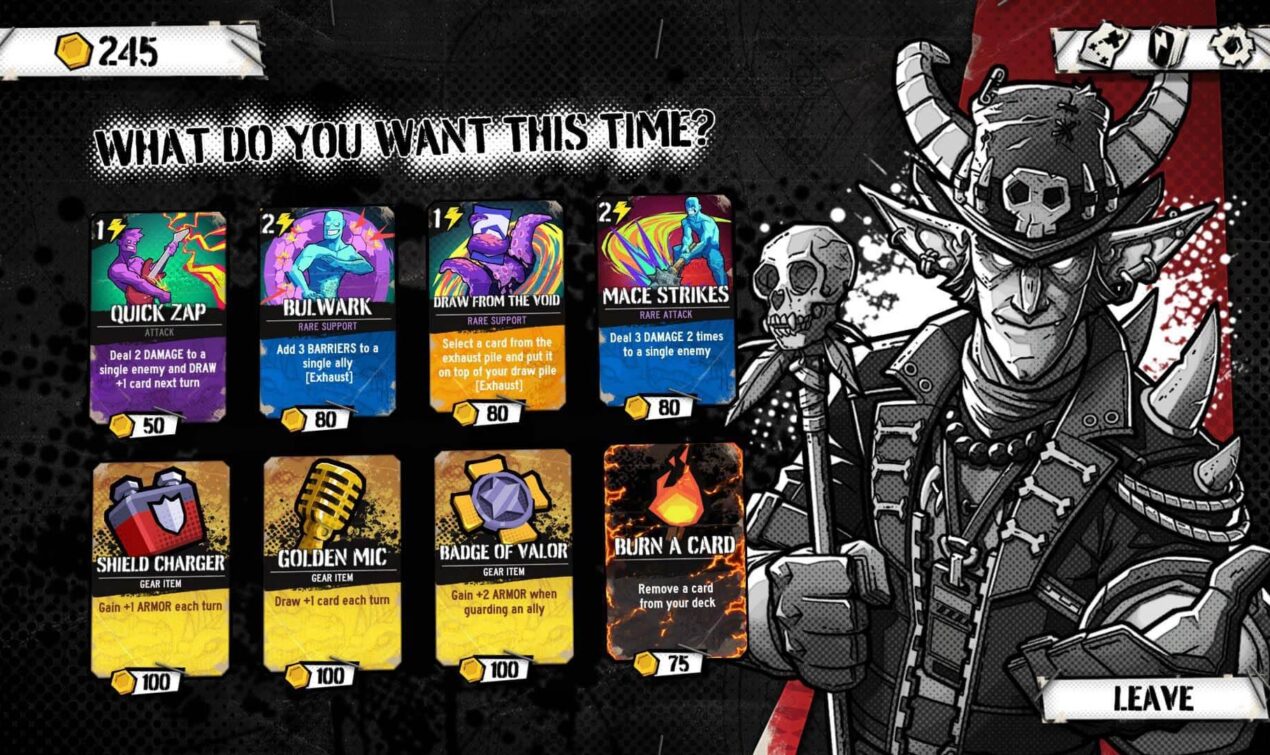
Like any(every) card game, a resource is required to use your cards. In Power Chord, it comes in the form of Energy. The better the card, the more Energy is needed; pretty much Card Games 101. Gameplay is centered around examining your randomly-generated deck of cards, and ensuring that all of your band members are in perfect harmony, so to speak. Icons that float above party members and enemy heads at the start of every round indicate exactly how much damage will be done to that character on that turn, and which exact enemy will be doing the damaging, respectively. You can use this information to your advantage as you can stun-lock an enemy and cause them to miss their turn, if you deal enough damage to break through their shield – and most demons will start each round with a shield. Each band member brings their own unique playstyle and cards to the demon duel. Each character also has four empty Item Slots you can equip Gear to, and further augment their abilities.
There are Boss Relics which follow the tried and true roguelike formula of helping AND hindering you in some way. A Boss Relic may offer +1 Energy which is great, but it will also remove those handy incoming damage indicators I spoke about earlier. And this sort of tradeoff is a choice you absolutely have to make, so consider the repercussions of your actions wisely as the effects are permanent. I once took a Boss Relic with increased damage while completely ignoring the fact that my deck would be besieged by Cursed Cards. I thought, “pfft…big deal, I just won’t use the Cursed Cards”. Man, was I WRONG, and that one bad decision ended up costing me a pretty great run up until that point. But that’s also the best part of a game like this: you are constantly learning, adapting, and sometimes you have to fail (a lot) just so you can succeed, and in the most satisfying and sensational ways ever.
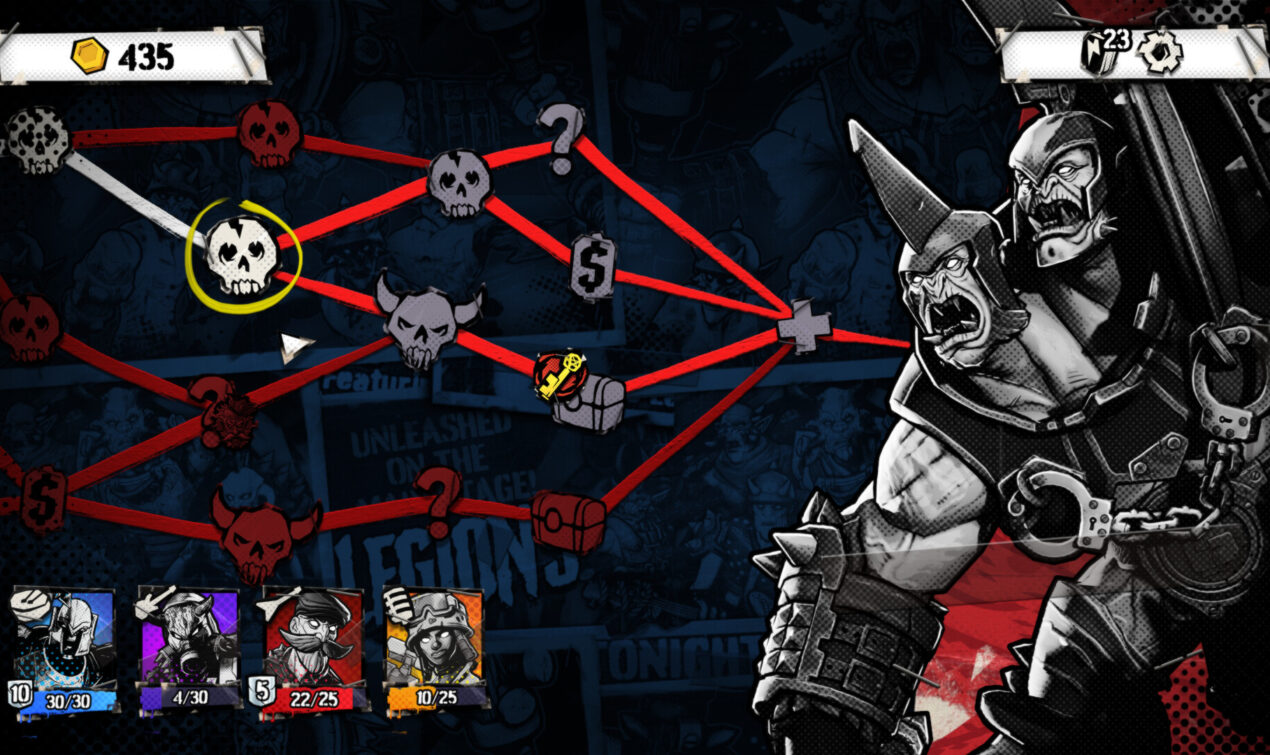
Much like Slay the Spire, – which is very much a great big influence here – Power Chord makes use of a big ol’ map with multiple branching path to explore. On the map you’ll notice small, not-so-scary skulls for simple, almost-guaranteed wins against a semi-threatening group of baddies. Similarly, there are bigger, way-scarier-looking, horn-y skull heads that indicate an Elite Battle. These encounters are way harder but promise better rewards, like epic/rare cards and more monies. There are Question Mark icons which can benefit you, or completely screw you over. For instance, you may be given a choice between paying a small amount of money for a chance at a rare card or item. If things don’t go in your favor, you may end up in an unexpected battle. This may sound like a minor inconvenience but if you’ve been battling for a while, and you haven’t had an opportunity to heal up, this could mean curtains for your current run.
Speaking of healing up, Rest Stops are placed here and there on the map and allow you to heal 30% of every band members’ health, fully restore one band member’s health, or bring a dead band member back to life with 50% of their max HP. Lastly, there are Treasure Chests which offer random loot and Shops to spend that hard-earned coin on cards, gear, etc. The layout of each map has got some nice balance to it as well. While randomly-generated, you’ll never go too long without being able to heal and do some shopping. You’ll need all the help you can get as some of the enemy encounters – especially the Boss Fights – can be exceptionally challenging.
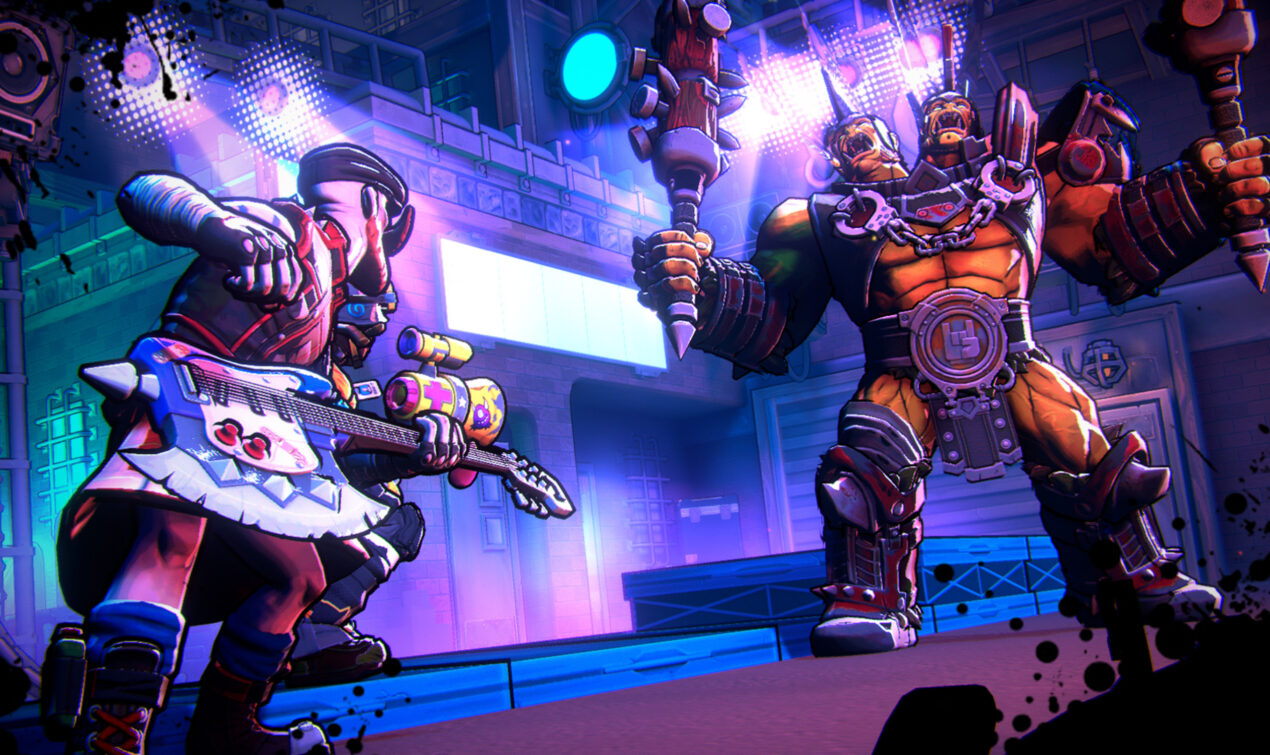
Enemies come in all shapes and sizes and just like your band, feature creatures that specialize in certain things. You can have a demon that just likes to (annoyingly) cast shields on its entire party. Others just like to debuff the shit out of you, and can reduce your damage output to zero. And then there are those that just like killing stuff and can deal a lot of damage at once. Boss Fights are extra intense as they will take everything you’ve got. These guys (and gals) usually bring a minion or two along the ride, hit extra hard, and come to the fight with a HEAVY shield. Expect to be in these matches for a bit as you have to manage the bands’ health and defenses, while you dish out damage and chip away at the big baddie’s huge health pool. On the bright side, every band member will be restored to full heath and brought back from the grave at the end of every large-scale boss encounter. It sort of allows you to go all out and play a tad more aggressively than you would during a basic match. Even if one member is left alive at the end of a Boss Fight, you will still come out on top and you will start with a clean slate on the next map.
Power Chord is a striking visual display. It’s brightly-colored artwork jumps off the screen as it screams for your attention. Equally as intense, is the game’s hard rock soundtrack which will unleash your inner head-banger. Character and enemy designs ooze personality and detail, and the same can be said for the art on the playing cards, each one more exceptional than the next. I could see the iconography and the vibrant colors coming off as a bit too ‘busy’ for some, but I feel it just adds to the charm.
What makes Power Chord so great, aside from it’s slick aesthetic, head-banging soundtrack, is that it’s not trying to be another Slay the Spire or Monster Train (hellish similarities aside). Yes, the influence is there, but Power Chord has a playstyle all its own. It marches to the beat of its own drum, and it is music to my ears. It’s fun, and incredibly hard to put down once you start playing. It’s a wicked cool deck-builder that is my first favorite indie game of the year. It’s the perfect pick-up-and-go game – which is especially true if you happen to own a Steam Deck. I found myself playing for hours in bed, letting my lack of sleep become a ‘future me’ problem. In fact, I should go on the record and say that if you own a Steam Deck, then you should own this game. And while I’m telling you to go buy things – pick up Foregone too. It’s like 80% off and costs less than a cup of coffee.

Power Chord is available on Steam and is currently my go-to Steam Deck game for the foreseeable future.
